No, We Should Not Arm The Syrian Rebels
The argument that the United States should start assisting the rebellion in Syria has many flaws.
Walter Russell Mead argues that the United States should consider arming the Syrian rebelsin order to avoid a worse outcome:
The worst case for the United States in a post-Assad Syria would be that groups linked to al-Qaeda become dominant players either in the country’s government as a whole or in control of significant regions in a country that fragments. Such groups would be nests of terrorists acting to destabilize not only Syria itself but Iraq, Lebanon, and the wider Middle East. They would certainly be active in Russia and, through extensive ties with the Arab diaspora in Europe, add considerably to the security headaches the West faces. They would be actively working to destabilize governments across the Arab world as well and providing shelter, training, and arms to terrorists from all over. In a worst, worst case scenario, they get hold of Assad’s WMD stockpiles and start passing them out to their friends. The United States does not want any of this to happen. We could not long stand idly by if it did. Aiding the less ugly, less bad guys in the Syrian resistance, and even finding a few actual good guys to support, isn’t about installing a pro-American government in post civil war Syria. It’s about minimizing the prospects for a worst-case scenario—by shortening the era of conflict and so, hopefully, reducing the radicalization of the population and limiting the prospects that Syrian society as a whole will descend into all-out chaotic massacres and civil conflict. And it’s about making sure that other people in Syria, unsavory on other grounds as they may be, who don’t like al-Qaeda type groups and don’t want them to establish a permanent presence in the country, have enough guns and ammunition to get their way. This is not a plan to edge the United States toward military engagement in Syria; it is aimed at reducing the chance that American forces will need to get involved.
Daniel Larison strongly disagrees:
Shortening the conflict is almost certainly not what will happen. Arming the opposition in Syria will prolong the conflict by providing at least some anti-regime forces with the means to keep fighting much longer than they could without this support. The goal of such a policy is to bring about regime collapse, which will make for even more “all-out chaotic massacres and civil conflict.” Helping to collapse the existing government will create a vacuum that terrorist groups can and will exploit. This is not something we have to speculate about. We’ve seen it happen in Iraq, and we have started to see it to some extent in Libya, and of course it is clearly happening in northern Mali where the authority of the Malian government has completely collapsed.
Larison has the better side of the argument here, I think.
He’s correct to point out that arming the rebels, or some small faction of them assuming that we can even correctly identify who the “good” guys are at this point, is more likely to prolong the conflict than it is to shorten it. It’s fairly clear that the Syrian Army remains both largely loyal to the regime and well armed, that last part thanks in no small part to arms shipments that continue to come in from Iran and Russia. If the West were to step up its efforts to arm the rebellion, then it’s rather obvious that Syria’s remaining allies would similarly step up their efforts to reinforce the Assad regime. Since the Syrians are the ones who have the heavy weaponry and the aircraft, that would seem to indicate that they’d have the ability to hang on for quite some time unless there was some kind of game changer like a military coup or a military intervention from the outside. So, arming the Syrian rebels isn’t likely to shorten the conflict at all.
Additionally, there’s absolutely no reason to believe that lengthening the Syrian Civil War (and that’s exactly what it is at this point no matter what the experts call it) doesn’t strike me as the best way to diminish the possibility that radical forces will end up gaining control of the country at some point in the future. Indeed, a long and prolonged civil war would seem to be fertile breeding ground for the radicals. They are the ones who seem to be most dedicated to their cause, after all, and thanks to a largely open border with Iraq it’s fairly easy for them to slip into the country. We saw the same phenomenon during the Libyan war when radical elements latched onto the rebellion that took birth in Benghazi. Now, they’ve implanted themselves in the vast stretches of Libya’s eastern and southern desert areas, and, as Larison notes, they have had a significantly damaging impact on the political stability of Libya’s neighbor Mali. Is there anyone who doubts that the radicals that are part of the amorphous Syrian rebellion would end up acting in a similar manner?
That brings in the final complication that Mead seems to ignore in his argument. We’ve already seen how the Libyan Civil War has impacted at least once of that nation’s neighbors. Syria exists in the middle of the most volatile region on the planet, bordered on its west by Lebanon, its east by Iraq, and on its south by Israel and Jordan. A post-Assad Syria that mirrors to some extent what we saw in a post-Qadaffi Libya would be a complete and utter disaster not only for Syria, but also for the entire Middle East. It would potentially mean a return to internal conflict in Lebanon as Hezbollah attempts to grab power to make up for the loss of its primary sponsor, increased assertions of independence by the Kurds in Syria’s Northeast that could easily spread into Turkey and Iraq, and, of course, there’s the possibility of militants near the Golan Heights threatening Israel, which would just inflame the situation even more.
Situations like this are always difficult from a humanitarian point of view. It’s very tempting to say that we need to step in any time an oppressive government is doing horrible things to the citizens of the nation it purports to rule. We can all make plenty of speeches about the good intentions we have when we intervene in situations like this. However, as the old saying goes, the road to hell is paved with good intentions. We’ve intervened in many nations over the years, and the results have been less than spectacular. Perhaps we should think twice before embracing these Syrian “freedom fighters.”
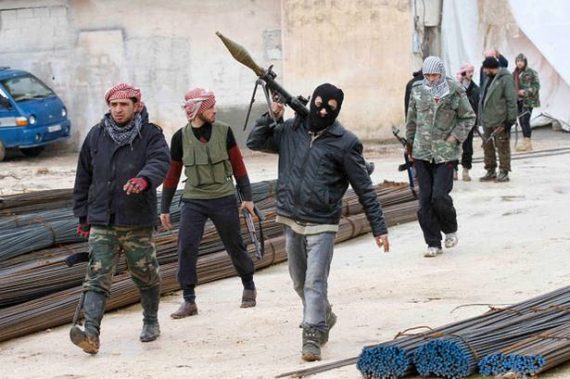

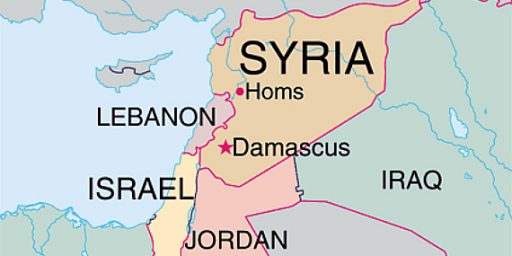
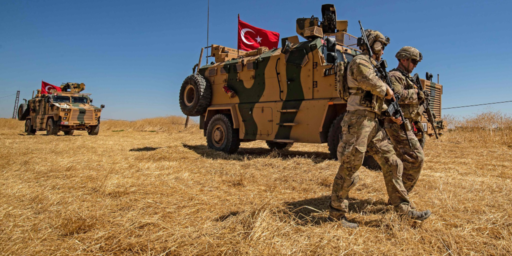
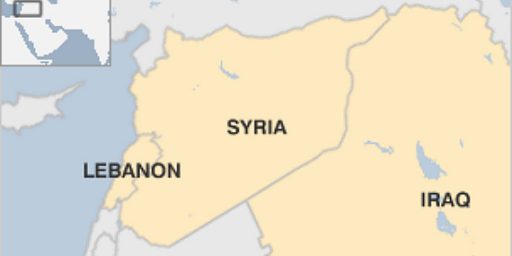
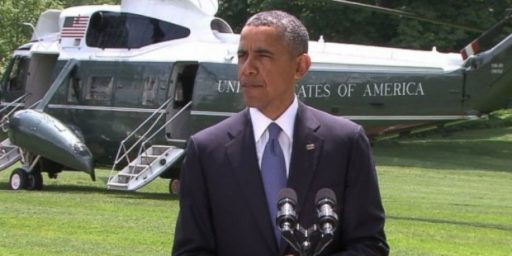
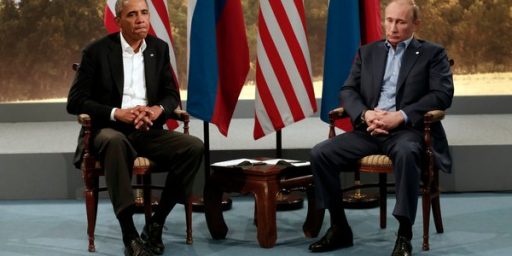
Our last two major ventures into arming rebels wound up with weapons going to Al Qaeda (Afghanistan) and Iran (Iran-Contra).
Hmmmmm.
Absolutely agreed, Doug – Mead is just plain wrong. Not only is there no reason to believe our arming the rebels would prevent further destabilization, it would absolutely guarantee that any violence that does result in the region will be forever seen as “America’s fault”. Arming the rebels is simply a no-win scenario.
Doing other things to make life miserable for Assad, OTOH, I am totally down with.
I am sick to death of people who think the US should intervene in every other nation in the world…yet want the government to stop babying Americans.
Disconnect, much?
Well, if Turkey gets more shots lobbed at it across its border, the whole question may be moot…..They’re a member of NATO.
Interesting how all these radical fundamentalists, if living in the society/economy they wanted, wouldn’t have any of the weaponry they’re so gleefully shooting off. The only economy a government of the Taliban can be in equilibrium is one of subsistence farming. The weaponry they’d be forced back to using in defending themselves is throwing rocks. A jolly good idea.
I think we are far more likely to get involved if Turkey and Syria escalate to all out war.I’d hold off on arming the rebels for now.
As I said yesterday Syria is a multi dimensional war – civil war, Hezbollah vs al Qaeda, Shia vs Sunni, Saudi Arabia vs Iran and Turkey/NATO vs Russia. This is a ticking time bomb and we should stay clear. In fact it’s another really good reason to get out of the area all together . If we were not there they would be fighting each other not us.
I don’t agree with Doug. All of the negative consequences he’s afraid are already realized without our more active intervention. The rebels are already being shipped weapons. The region is already destabilized. 10% of the country has evacuated already. The instability risk argument is moot – we’ve already arrived. Honestly, at this point the best thing for stability is for Assad to lose as quickly as possible. Otherwise, the only two realistic options are literally decades of civil war – the most destabilizing outcome you can imagine – or the 15% of the country that favors Assad exterminating the other 80%.
It’s not an open-and-shut case, and outsiders shipping arms to civil wars often makes them worse / prolongs them. But if it’s already happening, the best possible thing is to make the least horrific side with the best case for stability post conflict develop as overwhelming advantage as possible and bring it to an end.
We’d rather see a million Syrians die than accept the extremely small chance that one of a few hundred AA missiles might end up killing a few tens or hundreds of americans.
Doug,
your analysis is excellent, except for one fatal flaw: Assad will be gone within 18 months.
Even with Russian and Iranian support, this war is going *horribly* for the Assads.
Today the rebels completed a 48 hour assault in Maarat al-Nuaman that cut the Damasus-Aleppo supply route. Think what that means about the state of the Assad military: even with 48 hours, they could not bring in enough heavy weapons to stop an ongoing rebel assault in a town with TWO Syrian army bases.
Meanwhile, in increasingly besieged Aleppo, we see this:
http://yallasouriya.wordpress.com/tag/al-taaneh/
The rebels over-ran an base with millions of dollars of Russian anti-aircraft missiles. How eager do you think this makes Putin to send any more expensive weapons to Assad?
Indeed, Assad STILL hasn’t completely cleared Damascus. There is has not been a single effective Assad counter-offensive in two months – two months that saw a vital boarder crossing into Turkey and another into Iraq openly fall to the Rebels.
To be clear, I am not saying the rebels will “win.” I am saying Assad will lose. And when the ensuing Lebanonization of Syria occurs, we’re going to need some folks who like us.
So let’s start passing out (a few) weapons now, so that we have some chits to play as we seek allies in the post-Assad chaos to act as a counter to the Al Qeda folks.
There is a risk of meet the new boss, same as the old boss.
Another major issue is that we can’t be world cop kojak solving everybody’s problems everywhere for eternity. If we intervene in Syria does that mean we have to intervene in Sudan and Colombia too?
Syria is not a strategic country. The power vacuum idea doesn’t really fly. If they turn into more of a shithole it’ll be contained, won’t it? Basically they’re landlocked and what little coastline they have is meaningless. Both Israel and Turkey could kick Syria’s ass. Hell, the Kurds of Iraq probably could kick Syria’s ass. The Syrians don’t have oil. They don’t have anything of substance nor necessity. Now, of course, that all said, if there are serious indications that they’re developing WMDs or becoming a conduit for the movement of WMDs then, yeah, we’ll have to intervene, but that’ll be a direct intervention, not by arming the rebels.
The other elephant in the room is Iran. If we arm the Syrian rebels how can we justify not arming the Iranian opposition? And pretty soon we’re going to be engaged in a war against Iran. It’s inevitable. Or at least we have to plan as if that contingency is right around the corner. Do we want to be on the ground in Afghanistan and fighting a proxy war in Syria when the Iranian issue hits critical mass? I think not.
@Tylerh:
If that is the case, they are doing fine without our “help” in the form of arms.
Let the $audis take care of that. Our direct involvement creates a situation that puts pressure on other “great power” political leaders to get involved in order to avoid appearing weak.
With our economic power, we always have “chits”.
Sunni regimes are not known for their tolerance of religious minorities, in this case, Christians. The Shia/Alawite regime has tolerated the Orthodox. If we had some way to guarantee the futures of minorities in a Sunni Syria, maybe there’d be a way to back the rebels. But with the very real possibility that the next regime could start ethnic cleansing of both Alawites and Christians?
It’s tempting to get involved just to mess with Iran, and because Assad is an animal. But this feels way too much like we’d be getting into the middle of a game of three dimensional chess. Too many unknowns, too many moving parts.
Now, if it’s an actual war between Syria and Turkey, then we have no choice. Turkey is NATO and if we crapped out on them we’d lose Turkey. And a straight-up Turkey v. Syria war is a better deal for us I think than some back-door intervention — more likely to succeed quickly. But we’re not there yet.
Kind of surprised this is coming from Mead…
plus, they have no oil and russia backs assad- 2 things we don’t want to mess with. of course if he messes with turkey then who cares, game over. like that region will ever be peaceful anyway?
@Tsar Nicholas:
Finally something we can agree on Tsar!
Don’t get this coming from Mead. After all, he wrote only last June,
And that fact sure hasn’t changed, just intensified.
And today on BI: “US Weapons Are Ending Up In The Hands Of The Worst Possible Group In Syria.” We are arming al Qaeda-ish organizations there, and we know we are.
And then in the Washington Post only yesterday: “How Obama bungled the Syrian revolution.”
I have written repeatedly on my own blog: there is no US national interest to be served in aiding the Syrian rebels. If they prevail they will be at least as hostile to the United States as Assad, and probably more so. They will furthermore carry out a ruthless bloodbath against Alawites, Christians and Druze, just as several commenters have already pointed out.
@Dazedandconfused:
An excellent point – we always have economic chits to play.
Still, careful passing out of arms can stil be a good idea — it proved a great idea in Afghanistan.
Remember: the Taliban did not form until AFTER the Russians left. The Taliban was incubated byt Pakistani intelligence services to defeat the folks who kicked out the Russians, include the pro-WEstern ” Lion of Panjshir” – Ahmad Shah Massoud
I agree this is a dangerous game. But given what’s coming — a bigger version of Lebanon — trying to strengthen the hand of folks whose top agenda item won’t be killing Westerners seems prudent.